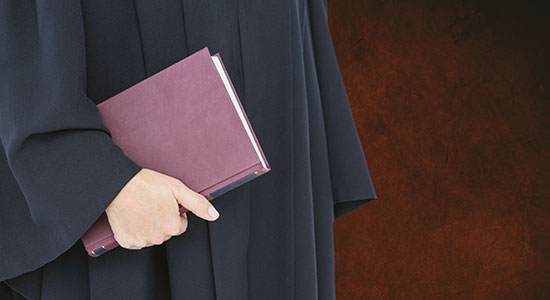Quotable

“Capital has rushed into our space like a flash flood into a canyon gully.”
– Ralph Sutton, a former trial attorney and CEO of Validity Finance, a litigation finance company based in New York City.
Sutton wrote on the benefits and potential concerns of litigation financing in The American Lawyer. On one hand, it gives litigants funding options and law firms new tools to boost profits.
On the other hand, litigation funders are generally focused on profits – not the merits of the client’s case, and nonlawyer funders may lack understanding of attorney ethics rules.
Either way, Sutton said, litigation financing is here to stay.
“In the next several years, sophisticated law firms in the Am Law 50 will routinely offer their clients financing options” and create litigation-financed portfolios across departments.
“These portfolios will help boost sorely needed profits and will better align firms’ incentives with those of their clients,” he wrote. “In the very near future, corporate law departments will use financing for defense funding.”
Sutton said Wall Street is driving much of the growth in this area, since “litigation has been discovered as a new asset class that’s impervious to the gyrating stock market, to rising interest rates, and to the economy as a whole.”
Got a Nugget to Share?
Send your ideas for interesting facts, trends, tips, or other bits and bytes to wislawmag@wisbar.org, or comment below.
By the Numbers
12
– The number of lawyer/legislators who will serve in the Wisconsin legislature in the 2019-20 session.
The number of lawyers in the legislature continues to decline, due to retirements and campaign losses. In the 2017-18 session, there were 14 lawyer/legislators, which was up slightly from the 2015-16 and 2013-14 sessions (13 lawyers), but down from 17 in the 2011-12 session.
Ten lawyers will serve over the next two years in the Assembly (seven Democrats and three Republicans). They are:
- Gary Hebl (D-Sun Prairie)
- Jim Ott (R-Mequon)
- Chris Taylor (D-Madison)
- Steve Doyle (D-Onalaska)
- Evan Goyke (D-Milwaukee)
- Jimmy Anderson (D-Fitchburg)
- Daniel Riemer (D-Milwaukee)
- Cody Horlacher (R-Mukwonago)
- Ron Tusler (R-Appleton)
- Marisabel Cabrera (D-Milwaukee).
Two lawyers will serve in the upper chamber beginning in January: Fred Risser (D-Madison) and Lena Taylor (D-Milwaukee).
Inauguration day for the 2019-20 legislative session is Jan. 7, 2019.
Source: Cale Battles, Senior Government Relations Coordinator, State Bar of Wisconsin
Out There

Happy Day: A “Big” Win for Habeas Corpus
A New York judge recently ruled that a habeas corpus petitioner was being unlawfully imprisoned.
The petitioner? An Asian elephant named Happy, housed at the Bronx Zoo, and now known as the world’s first elephant to win habeas relief.
The Nonhuman Rights Project (NhRP) petitioned the court on behalf of Happy, arguing that she is too smart to be caged. Lawyers for Happy noted that she was the first elephant to pass the mirror self-recognition test, which correlates with higher forms of empathy and self-awareness in animals.
In November, the judge ordered that Happy be released immediately and placed in a sanctuary that would allow her to roam more freely. NhRP set up an inter vivos trust to support Happy’s care and maintenance at the sanctuary.
Source: Courthouse News Service
Good Ideas

Can Autonomous Vehicles Make Ethical Decisions?
Last month a Google-affiliated company called Waymo launched a fleet of self-driving vehicles as a paid taxi-service in Phoenix.
Waymo, with a fleet of 600 vehicles, has tested the technology for a decade – as have companies like Uber – but this is the first time any company has actually charged customers to ride. Human drivers are present, but only for emergencies. Sometime soon, human drivers will be removed.
Autonomous vehicles are coded to make decisions on speed, braking distance, use of turn signals, and other technical operations and rules of the road. But how will autonomous vehicles make ethics-based choices when confronted with an inevitable accident, such as hitting a jaywalking child to save elderly passengers?
“Even in the more common instances in which harm is not inevitable, but just possible, autonomous vehicles will need to decide how to divide up the risk of harm between the different stakeholders on the road,” according to a recent article by MIT researchers, who argue that operating systems should reflect ethical preferences, based on human consensus.
“Once this data is collected, the global community can come together and create a universal code of ethics for these technologies,” wrote Ioua Alen Marcyn B. Lagazo for the Marquette University Law School Faculty Blog.
From the Archives

They Shall Be Robed
In 1927, William J. Anderson argued that the members of the Wisconsin Supreme Court should wear gowns at their public sittings, rather than ordinary business suits.
“I know, in a state where the traditions of social and official practices are what they are, this may sound like blasphemy,” Anderson wrote.
“The same people who would object that for the members of the court to wear silk gowns would be, to use the vernacular, ‘putting on too much dog,’ wouldn’t hesitate to criticize a man who would appear at a funeral dressed in the spangles of a clown.”
Anderson argued that gowns “add to the dignified appearance” of the supreme court and the “picturesqueness which naturally attach to the highest judicial body of the state.”
It is not clear when Wisconsin justices began wearing robes, although U.S. Supreme Court justices started wearing them in 1801. A Wisconsin
Supreme Court rule requiring judges to wear black robes was not adopted until 1996.
Source: Bulletin of the State Bar Association of Wisconsin, April 1927
Tech Tip

Make Your Back-ups Indestructible
Lawyers hear a lot on planning for disasters, for good reason. Numerous examples, right here in Wisconsin, show devastating business interruption can occur when law firms are hit with natural disasters.
One of the crucial components of disaster planning is backing up critical data and storing it offsite, such as client files, detailed records of firm income, accounts receivable, payroll, and other documentation.
Offsite back-ups are the gold standard, but there’s another way to protect data locally. ioSafe (ioSafe.com) is self-described as “disaster-proof hardware.”
These products are essentially hard drives placed inside waterproof and fireproof enclosures. Some are even shockproof and crushproof. They give solo and small firms extra protection for those important data back-ups that are stored locally.
Source: Brent Hoeft, 50 Tips in 50 Minutes, 2018 Wisconsin Solo and Small Firm Conference
